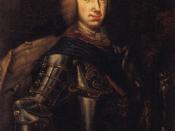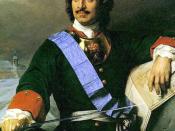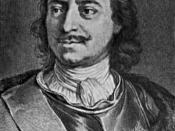Peter the GreatÃÂs manic will to implement his ideas was fundamental to his personality. His reign was therefore a metamorphosis for Russia. The army became effective, a navy was created, political stability was achieved, industry increased, old Russia- as exemplified by the Church and the Boyar tradition- were modernised and, through the creation of St Petersburg, the route to the west was opened both geographically and symbolically. The autocratic and rapid implementation of his reform was seldom based on sound planning due to a lack of consistency in his character. This led to economic suffering and in some cases the later reverse of the reform themselves.
PeterÃÂs administrative and political reforms were not fundamentally radical. He may have borrowed ideas from the West but he also maintained part of the old Muscovite system. Lack of innovation becomes evident as the Petrine superstructure was frequently discarded by PeterÃÂs successors to be replaced with their own institutions.
PeterÃÂs simple-minded personality is the key factor behind such political failure. To quote the Empress Catherine as she thoroughly examined PeterÃÂs papers ÃÂPeter did not know himself what laws were necessary to the state.ÃÂHis constitutional reforms were short lived, and this was partly down to his authoritarian nature as well as a lack in political understanding. The Muscovite structure of central government was based on the autocracy of the Tsar surrounded by the BoyarsÃÂ parliamentary Duma, the Zemskii Sobor- who were influential nobles- and the Prikazi, the government departments under the DumaÃÂs control. The institutions overalapped, Peter did not take their advice seriously and they were therefore inefficient. Peter replaced the Duma and the Zemskii Sobor with a Senate in 1711, with a mere 9 members. But for all his introduction of new institutions Peter preferred to rule as an autocrat and his successors bypassed...


